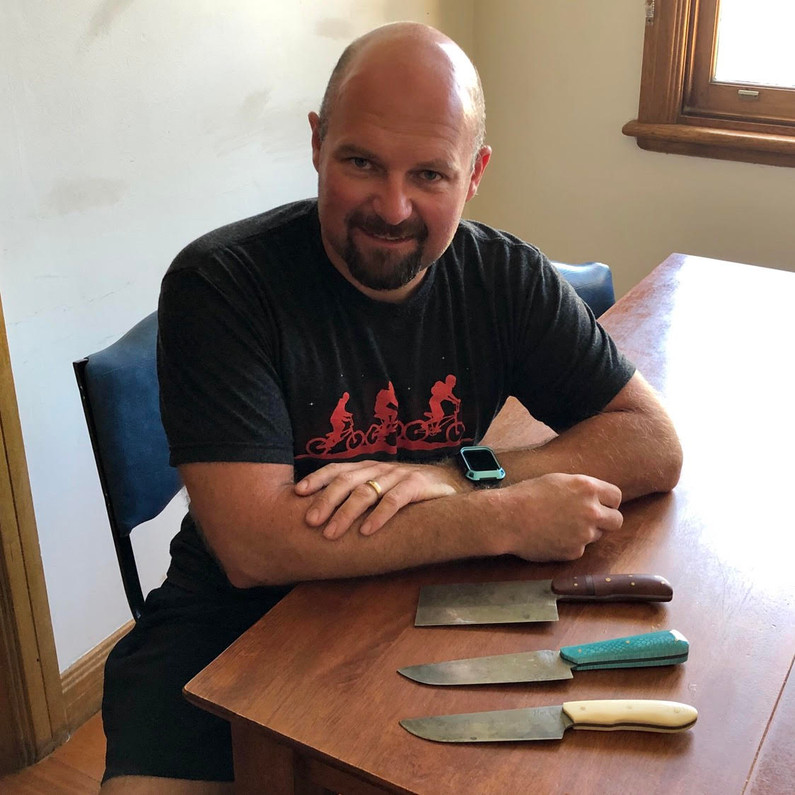Meet The Maker #2 - Ben McKenzie
Back and fresh from the Holiday Season, we've our second of the Meet The Maker series.
Ben McKenzie has been making knives for only a couple of years, but has most definitely seen the light and is now teaching knife making to Year 9 students as well making his own. It's an interesting journey, and one many of you will find an inspiring read!
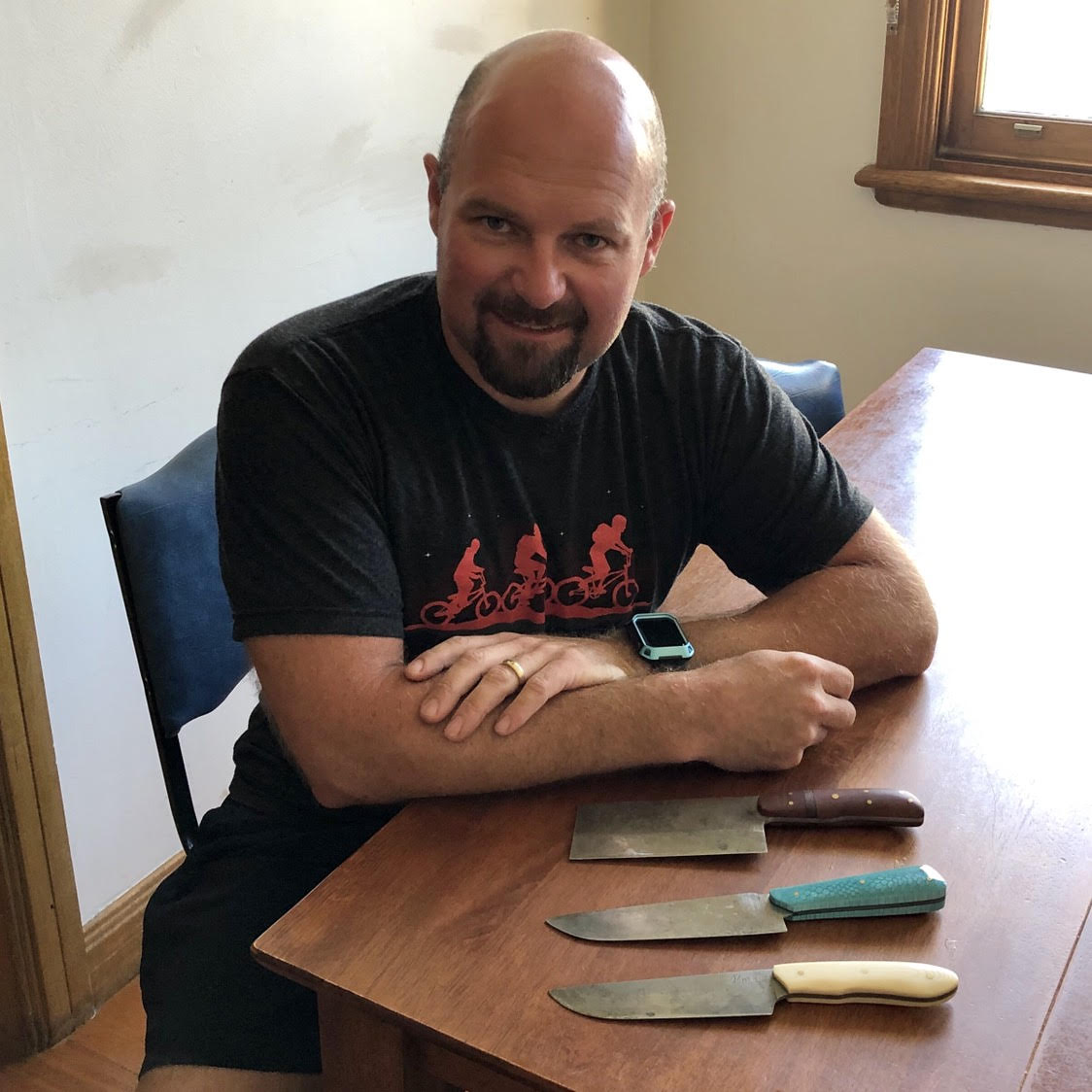
Ben McKenzie
Age? 40
Why did you start making?
I am a Design Technology (Woodwork/Metal/Electronics etc.) teacher having taught in Public and Catholic secondary schools for about 10 years in total. Before completing my teacher training, I worked as a Prosthetics and Orthotics clinician. I took a break from teaching in 2007 to share-farm dairy for about 6 years and have been back in the game since part way through 2013.
During my teaching time I have always looked for units of work that inspire kids, projects and programs to do that they couldn’t do at home or didn’t think they could achieve. If kids can get immersed in something then they don’t need external motivation- just the equipment, guidance and encouragement to pursue their ideas. Some of the current and previous projects I have worked on with students have included building a racing lawn mower and racing it, installing a large CNC and building flat pack furniture, making semi-professional metal detectors, 3D printed head torches, reverse steer bikes, dirt surfers, surfboards and Bluetooth rechargeable speakers. I have no interest in making pencil cases and neither do the kids!!
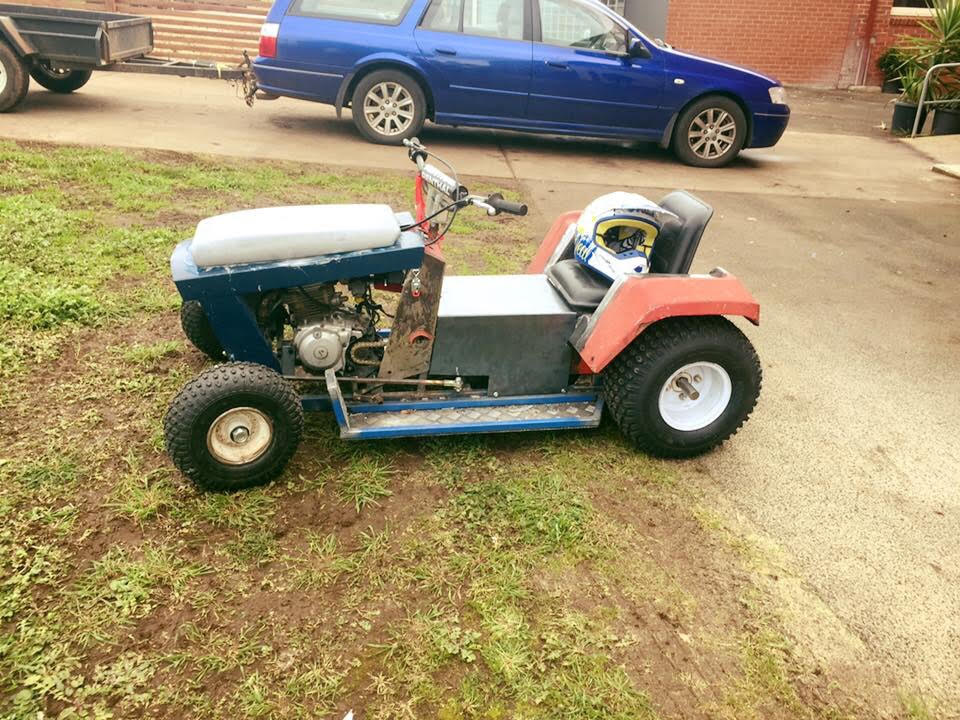

Lawnmower Go-kart
Technology teachers struggle to teach students general fabrication skills and use of common tools while also finding the time to deliver industry standard CAD/CAM and emerging technology such as 3D printing. Students have such broad curriculum choices now that we often find ourselves competing with other faculties for students and our learning units have to meet community expectations along with preparing the students for advances in fabrication and design. Finding challenging models that cover the curriculum and inspire the kids gives me a lot of satisfaction and bringing knife making to the classroom has been one of the most fulfilling projects to date.
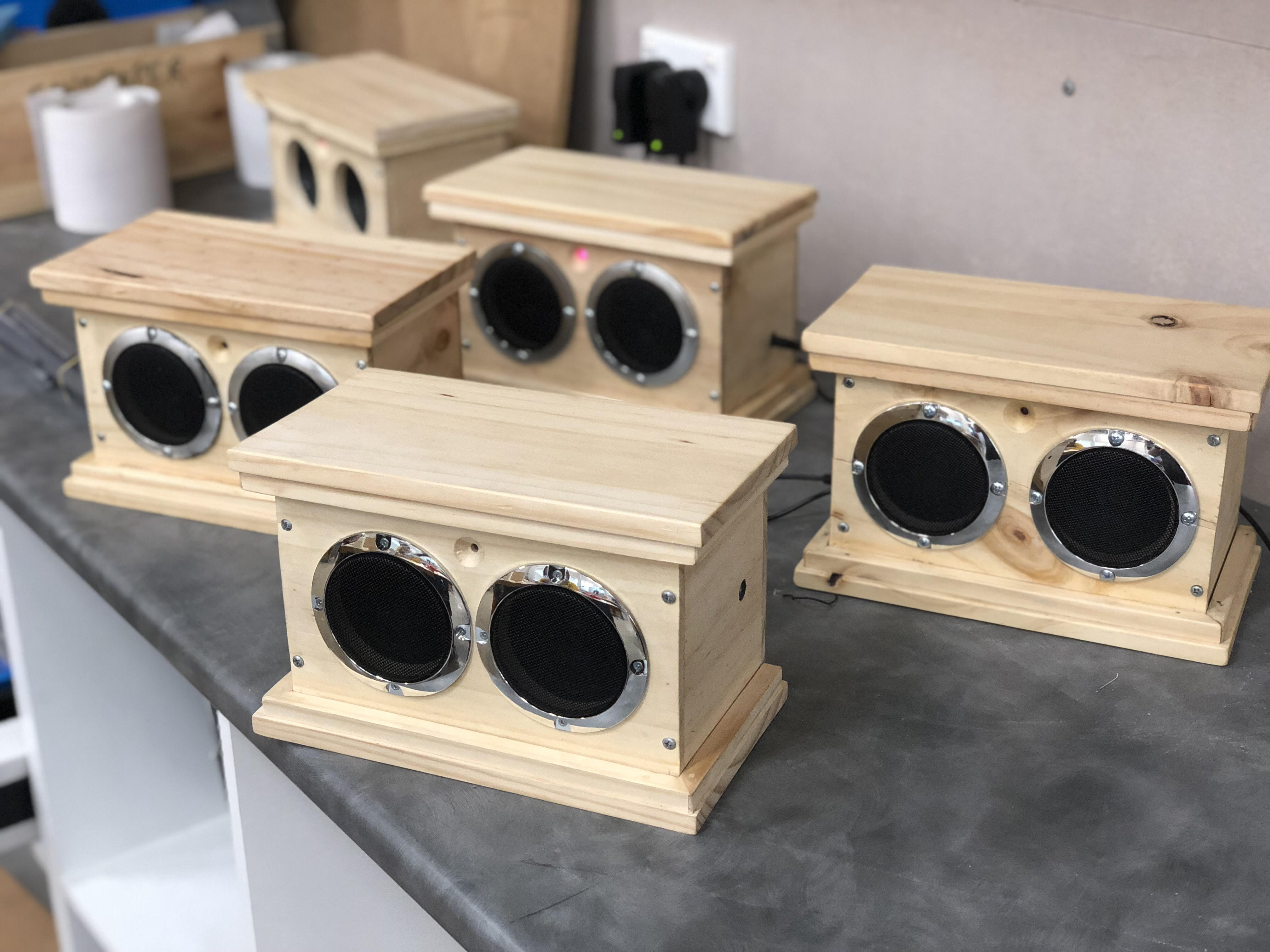

Bluetooth rechargeable speakers & Metal Detectors
During a mountain bike ride in 2017 I got talking to Les Batchelor about the kinds of projects I like to do and the way in which technical subjects have evolved. The main changes in old subjects like Wood and Metal are that you no longer just make set models. Students are often taught basic fabrication techniques using introductory projects and then given either an advanced model with some constraints and open considerations or some sort of problem to solve, i.e. ‘A family member requires a device for the following situation…… what will you make?’ After some time chatting about this, Les suggested that the Year 9 students could make kitchen knives as a suitable project. I was pretty intrigued and had never even considered making a knife or what was involved but once Les outlined the process I knew it had a lot of merit as a learning opportunity and would bring in some good metal fabrication hands skills along with a very high level of student buy in.
We discussed this a few more times with Les offering to mentor me and I got to a point where I knew we had to give it a go. I am fortunate to work at a school that is well resourced with progressive leadership who OK’d the project. We began to get serious and this was where having a mentor paid off. Les put together a course outline and suggested timeline along with an equipment and materials shopping list. I was able to organise most of the supplies and get started within a few weeks. I had to make a demo to test the project and inspire the kids!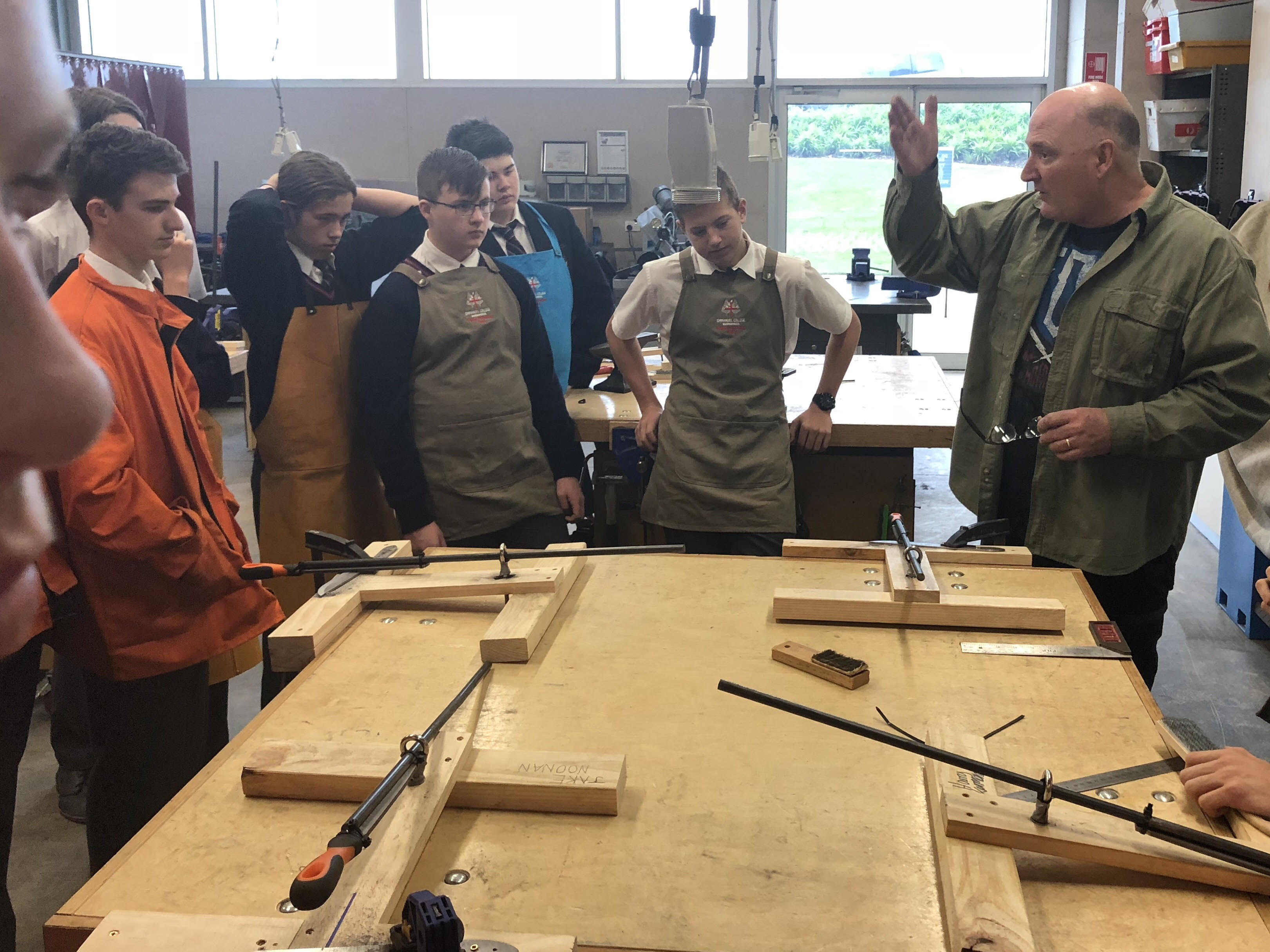
Class filing jiggs with Les
For the first class, Les suggested a kitchen/utility knife with not too many alterations. He suggested 1084 with micarta handles which reduced a lot of problems we could have faced. Before delivering the course, I worked alongside Les to make my own jig and then knife. This was my first knife and my first time using a forge and to be honest, I was hooked within the first session! From here, I finished my knife and began spruiking the subject to the students. We had a full class of 24 kids choose it for first semester 2018.
The first time around was very interesting, some kids took off and had their outline and bevels done within four weeks while others took a LOT longer. Every few weeks, Les would meet me after work and we would assess the progress and either fix some small issues or decide on the advice the students needed- we were mindful not to do their work for them but to keep them on track. Les attended two double sessions with the kids and one after school session and they absolutely loved it. We learnt a lot from the first cohort including how long they would take to do certain parts, how many instructions they could handle at once and how sore their arms could get! The second cohort improved their quality a great deal as I was able to advise them better at each stage and keep a little more control of their progress. Once again, Les attended two sessions and was able to spend some more time on explaining design and metallurgy aspects.
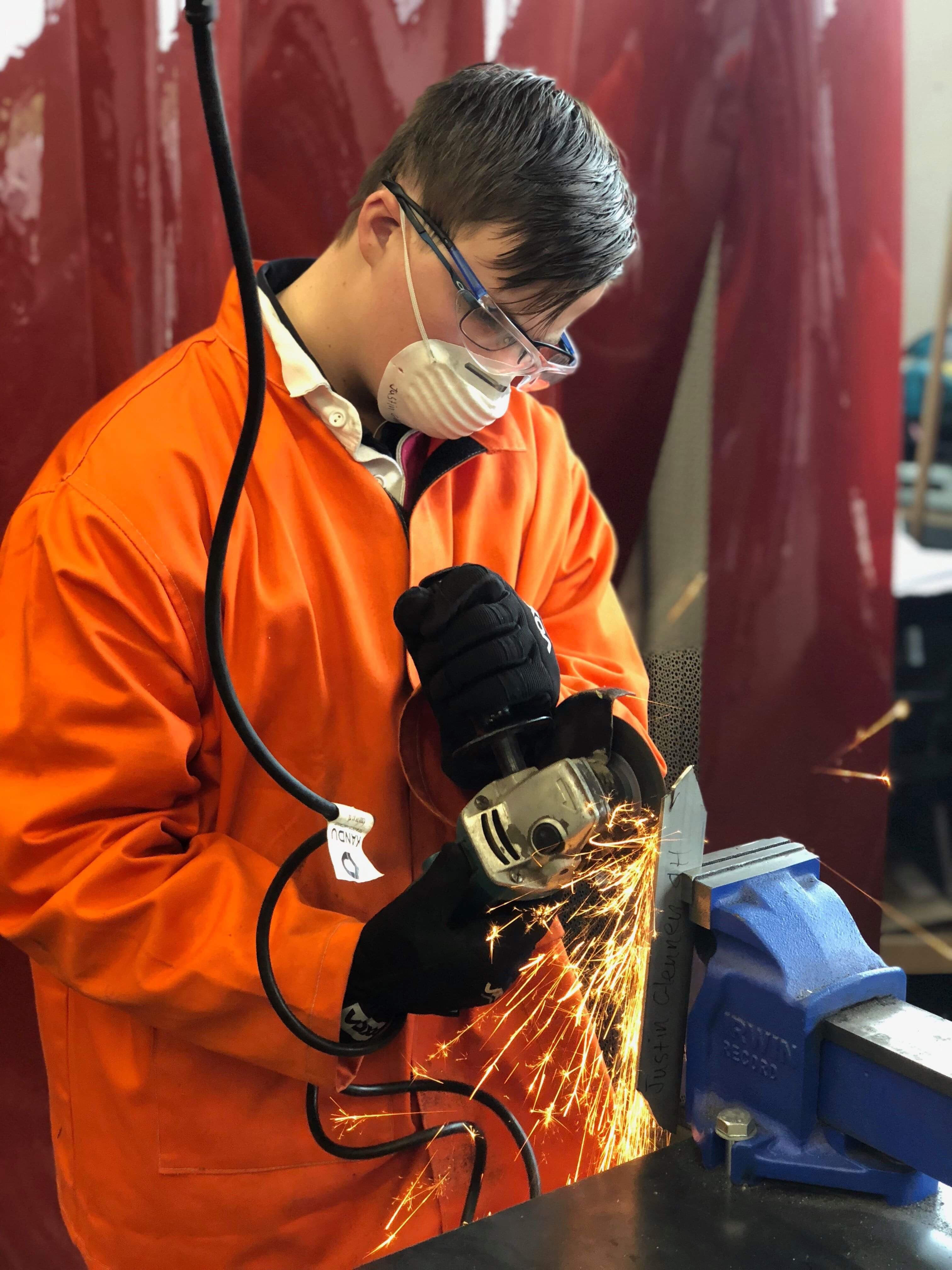
Student profiling
Overall, this project has been a huge success. It has been quite controversial to people who don’t understand the processes (‘Oh you’re the guy that makes knives at school?”) and to the families involved, they have been grateful their kids could make something so unique and special. Throughout the year Les and I have also had regular evening sessions in the workshop attended by other staff and friends who have produced some wonderful pieces. At the end of the year we held a three-day workshop with seven people to teach them the art. Two teachers attended from a Mt. Gambier school who intend to introduce this unit to their school curriculum and one Year 9 student, who is quite advanced, got to work closely with Les.
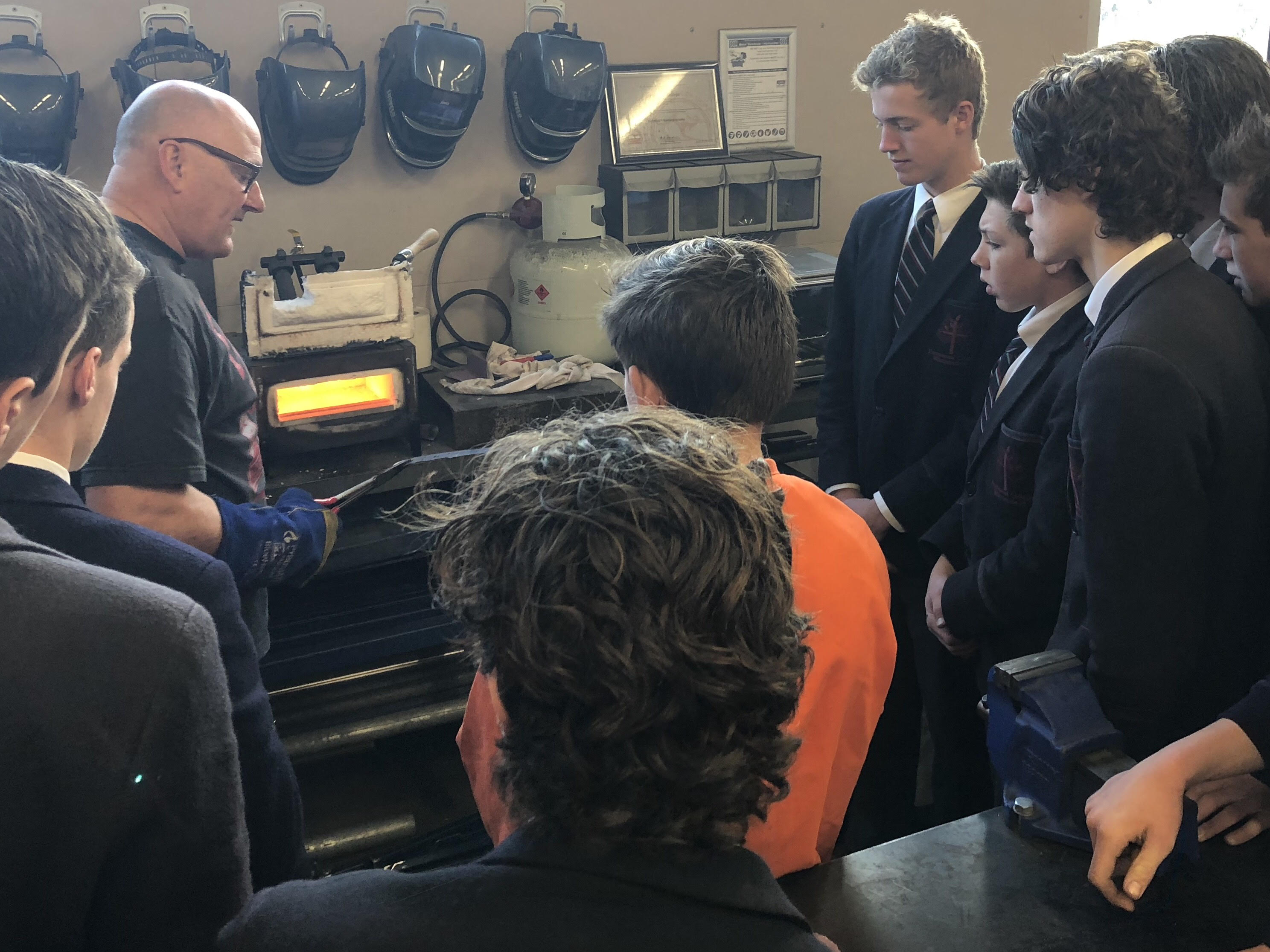
Class in progress with Les
In your time making or before, have there been other makers whose work you admire? Why?
During my limited time making knives I have come to realise that knife making is a very personal thing and something that has many different entry points for people. I admire all knife makers I see from beginners to professionals and I am continually impressed with the community and how they will answer questions and support each other. I am delighted when I see a young maker put something together and present it and I know that this person will be having positive conversations with people about the processes and how they will improve on the next one. They will be researching equipment and techniques and looking forward to progressing. I am also highly impressed when I see professionals augmenting their work to add more detail or extra functions I hadn’t thought of. I like to see professionals working with difficult steels and unique handle materials.
How long have you been doing it?
Since late 2017

Ben's first knife
How many knives approx in that time?
I have personally made four knives (with a lot of help), a 260mm kitchen knife, a midsized cleaver, a filleting knife and an angular Gyuto. I had been using the cleaver for EVERYTHING but am loving the gyuto for vegetable preparation now. I have a small laddered Damascus Tanto on the go at the moment and then plan to make a larger chef knife next. The filleting knife was a gift for a good friend.
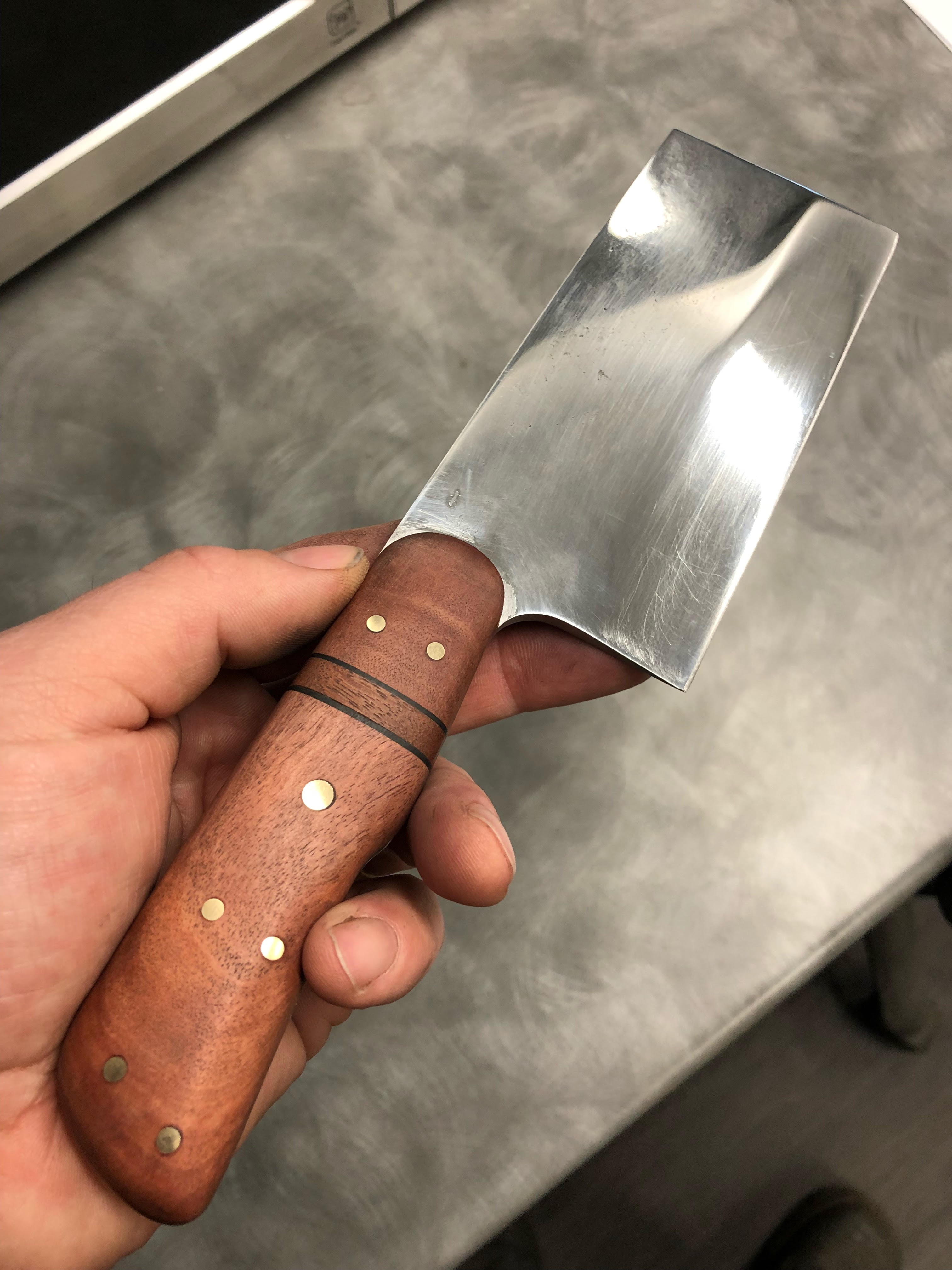
Ben's Cleaver
Sticking or Full tang - preference?
Full tang at this stage! Keen to try a hidden tang this year!
Do you have an area/knife type you like to focus on?
I am still working pretty holistically but, for my students I am definitely making them concentrate on removing all file marks and finishing the blade to a very high quality.
Favourite knife to make… as above? Or not…? Why?
I loved making the cleaver! Simple and not too much filing!!
Aspect of making you find the most difficult or frustrating?
Difficult is achieving and really professional finish. Playing with fine grits and buffing etc. is still very tricky for me and my students. The most frustrating part would have to be when you accidently mark your blade or handle while building them. One small scratch or dent and you can be back to the drawing board pretty quickly. The kids will clamp their sanded blade in a vice and then ask me how did these pits get in here????
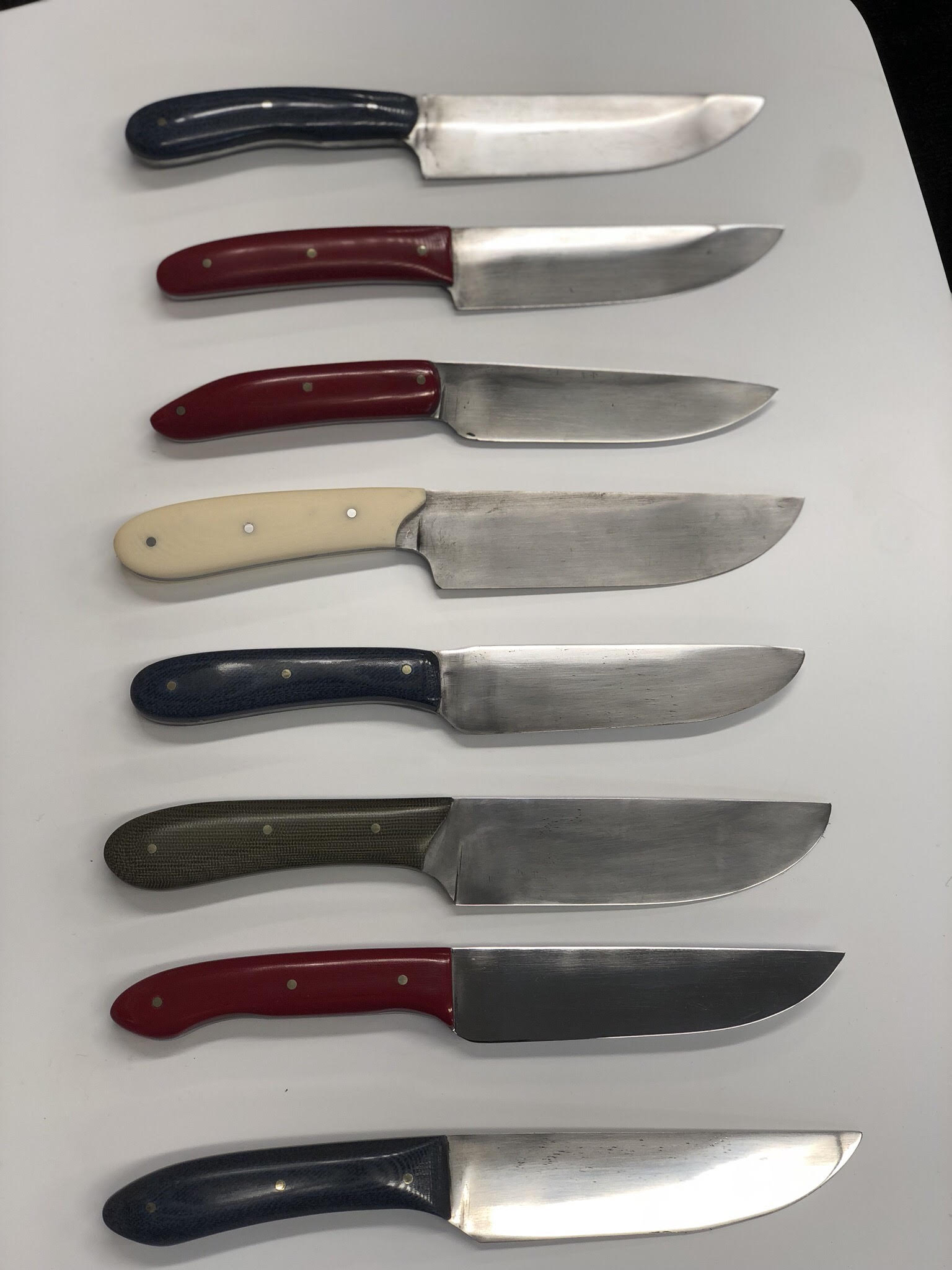
Some of the kid's knives
Most rewarding…?
For me, it has been seeing the students finish a product they are really proud of. Most units of work are 4-6 weeks and there is an instant gratification aspect. With this project students generally take 14-16 weeks from outline to etching and take home. It would be one of the longest units they do and teaches perseverance and persistence. I have also seen some students who may be considered a handful really get into this project and work to support each other. One particular boy was so proficient he finished early and was the go to for the etching process. He became the class ‘expert’ for this and his self-esteem got a major boost.
During the first cohort we had an afterschool session and parents we invited to come in 1/2hr before the end to see what we were doing and the comments we overwhelming. These parents continually told us that they were so grateful and excited to see the final products. Les and I got to overhear kids explaining the processes to their parents and this was all the reinforcement we needed to know that this project was hitting the mark.
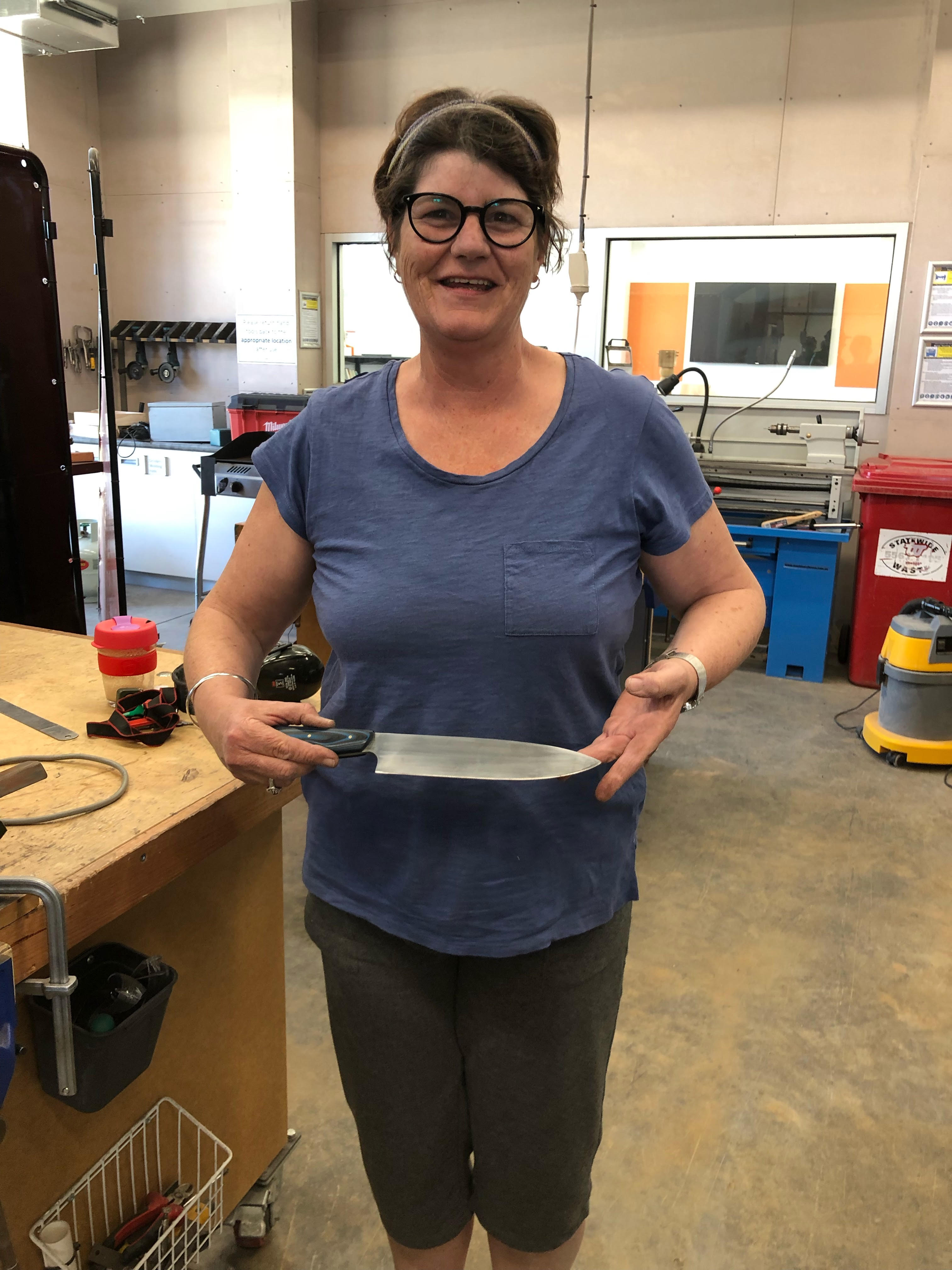
Food Studies Staff, Carmel’s chef knife from the workshop
Part of the safety considerations is that students must have a parent collect the knife form school. Lots of time the parents are amazed at the product and can’t believe we haven’t used blanks or CNCs etc. When the knives are finished I send home an email to parents asking them to take the time to discuss the processes and outcomes with their kids and also how to care for the steel. Here are a few of the responses.
“Darren and I both really enjoyed reading the overview of the term. Rhys has thoroughly enjoyed your class, it’s certainly fanned the flames of an already deep passion of his. Thank you for being such an engaged and caring teacher, it’s really nice to see that you respect the kids and how much time and effort they've put in to their knives. I know that teaching a group of 15-year old’s wouldn't be an easy task so it’s fantastic to read such positive feedback, it’s really a credit to you and your teaching.
Thanks again,
Kaye and Darren “
“Axel has had a great learning experience with this and has not stopped talking about his knife all the way through the project. This is his most talked about subject this year and has enjoyed your class immensely.
Regards,
Karolyn McKinnon”
Any favourite steels to use? Why?
Ha ha! 1084 is consistent, easy to work with and comes up a treat. We even got a few hamons!
Favourite handle materials? Why?
The green micarta comes up a treat and is easy to work with.
Knife making goals: Have you set any challenges for yourself - is there a particular skill you want to master, or a type of blade you’d like to make?
Personally, I am looking forward to learning how to use a jig so I can speed up the process a little bit. For my classes, I am looking at ways to allow the faster kids to do some extra (liners, hamons, different handles) so that it inspires the next cohorts to aim high. I’d like to get to a stage where Year 12 students choose knife making as a model to satisfy their senior curriculum requirements and this will just take time. I am keen to continue our evening sessions and look toward doing some more workshops as we could have had 30 people if we had the space.

Year 9 student who attended our workshop with his Dirk
And maybe, got 3 tips for anyone starting out?
For my students I suggest that if they have a question, they stop and ask before creating irreversible issues. I think this is good for anyone to remember and that most people are very generous with their time and knowledge if you are respectful and appreciative. I also like to remind students beginning new projects that this is YOUR journey. Your work will have its own successes and failures, it will grow from YOUR starting point and will be as good as you can be at that point with YOUR skills and knowledge. Don’t compare yourself to the person next to you or some person in the internet. Your work is yours and you can celebrate the good bits and learn from the not so good bits. Some people have a gentle progression and some are rapid, just keep focused on the fact that YOU are moving forward and don’t ruin the journey by concerning yourself with the output of others.
I’d like to use this last section to encourage any knife makers to get involved in education! You may have kids at school or know the technology teachers at a local school. I collaborate with a lot of technology teachers and we are a pretty good bunch ☺ always interested in something new and cool. If you think you would like to help a secondary teacher and they would like more information, I am always happy to share my documentation, folios and experience if it leads to kids doing projects that are outside the square!
Recent Posts
-
The Etch Test: Ferric vs Hydrochloric vs Gator Piss
The Etch Test: Three Very Different Looks From One Steel One of the great things about knife making …3rd Jan 2026 -
Why Bed The Tang In Epoxy - Then Knock it OFF Again.
What is "Bedding the tang"? Bedding the tang means gluing a stick-tang blade into the handle block i …21st Mar 2025 -
Marble Leather - How to Dip Dye Veg Tanned Leather
This was my first experiment with hydrodipping or dip dying leather, and it came out pretty cool! I …14th Mar 2025

